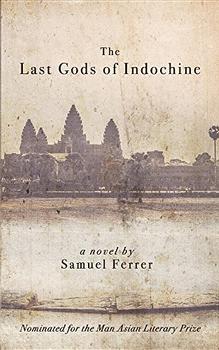Summary | Excerpt | Reading Guide | Reviews | Beyond the book | Read-Alikes | Genres & Themes | Author Bio

Critics' Opinion:
Readers' Opinion:
First Published:
Jun 2007, 272 pages
Paperback:
Feb 2008, 320 pages
 Book Reviewed by:
Book Reviewed by:
BookBrowse Review Team
Buy This Book
Following the runaway success of Snow Flower
and the Secret Fan, which was set in a remote corner
of nineteenth-century China where tradition and foot-bound women
developed their own secret code for communication known as nu
shu (woman's writing), Lisa See returns to tell a story set two
centuries earlier in which, for a short period, wealthy women in
the Yangtze delta area, often living in seclusion, published
their writings.
The mid-17th century was a turbulent time for China; the Ming
dynasty that had controlled China for almost 300 years (not the
China we know today but the South-East corner of the continent)
collapsed as the Manchus (from the North-East) invaded, raping
and pillaging as they went (eventually establishing the Qing
Dynasty which ruled until its collapse in 1912). During the
brief period between the collapse of one dynasty and the
consolidation of the next, a few brave female voices rebelled in
a literary way, not only writing but publishing their poetry.
Peony In Love brings to life two 17th century writings -
the opera "The
Peony Pavilion which celebrates the supremacy of love
over mortality, and "The Three Wives' Commentary" - musings on
love inspired by "The Peony Pavilion". "The Peony Pavilion", a
fifty-five scene play, which would have been performed over
several days, tells the love story of a young male student and
the daughter of a high official who, inconsolable in her grief
at not being able to be with her beloved, starves herself to
death early on in the opera rather than be married to another
man (an apparently not-uncommon response by young girls of the
time who had control over nothing in their lives except their own
bodies).
Like other young girls of her era, Lisa See's heroine, Peony, is
obsessed by "The Peony Pavilion" even before she sees it
performed at her family's house, during which she spies a
beautiful young man with whom she becomes besotted. Believing
herself betrothed to another and in thrall to the opera, she
starves herself to death - not realizing that the man she loves,
Wu Ren, is the same one that her family have promised her to.
After death, Peony promptly returns to earth as a "hungry ghost"
wishing to be reunited with her beloved.
Which leads on to the main flow of the story in which See gives
fictional heft to the lives of three historically-based women -
Chen Tong, Tan Ze and Qian Yi, who collaborated to write a
collection of insights about love inspired by "The Peony
Pavilion", known as "The Three Wives' Commentary". Whereas, in
real life the three women were all wives of Wu Ren, in See's
version, the dead Chen Tong (Peony) returns from the afterlife
to inhabit the souls of Wu Ren's two wives and guide their
hands to write "The Three Wives' Commentary".
Peony In Love hits all the right notes to be a popular
book for 21st century female readers, especially book club
members. In fact, it's an absolute shoo-in for book clubs,
replete as it is with talking points that explore love, loss and
redemption, and plentiful details about ancient Chinese rituals
and beliefs, many of which live on into modern times (such as
the believe that ghosts cannot turn corners). Added to which,
See's heroines, in their downtrodden determination to follow
the path of intellectual freedom, are very sympathetic to a
modern reader. Some readers may find the level of detail a little too much - no opportunity to
extrapolate on a cultural more is left untapped, no chance to
expand on a ritual or piece of writing is left unexplored.
But for those many readers who read to learn
as much as to be entertained, this powerful, graceful and
revealing book has a great deal to offer.
The Story of Peony In Love: Tang Xianzu's "The Peony Pavilion"
has caused controversy from when it was first performed in 1598
up until the current day. Almost immediately, different groups
advocated that it be censored, and many scenes were cut. In
1780, the opera was blacklisted as profane, and in 1868 it was
officially banned and all copies were ordered to be burned. In
2000, the Lincoln Center put on a full-length production that
was temporarily delayed when the Chinese government discovered
the content of the restored scenes and barred the actors,
costumes and sets from leaving the country. The reason for the
controversy? "The Peony Pavilion" was the first piece of
fiction in the history of China in which the heroine chose her
own destiny. Women of the time became entranced with the
concept, and many young girls destined for arranged marriages
chose to starve themselves to death so, like the heroine of the
opera, they too might choose their own destinies in their next
life.
In 2000, Lisa See wrote a short piece for Vogue about the
Lincoln Center's production of "The Peony Pavilion", and became
intrigued by the "lovesick maidens" who, on researching the era,
she found were part of a much larger phenomenon. Apparently, in
the mid-17th century, more women writers were being published in
China's Yangzi delta than in all the rest of the world at that
time - literally thousands of women. Some women published just
a poem or two, but others became professionals, supporting their
families with their writing. When See came across the "The
Three Wives' Commentary" - the first book of its kind written by
women to have been published anywhere in the world, which on
publication apparently caused such a furor that the Emperor
clamped down even harder on the freedoms of women, See's interest turned into an obsession - and the result is Peony in Love.
Keep reading at Lisa See's website
![]() This review
first ran in the February 21, 2008
issue of BookBrowse Recommends.
This review
first ran in the February 21, 2008
issue of BookBrowse Recommends.

If you liked Peony in Love, try these:

by Samuel Ferrer
Published 2016
Nominated for the Man Asian Literary Prize ("The Booker of Asia")
"A sublime tale told by a master storyteller, steeped in the lore of old. Ferrer's conjuring of romantic Indochine is a journey that lures, stirring up ghosts in a wild phantasmagoria, reckoning with forces both entwined and eternal." - Angela Kan, Travel Host & Writer, The ...

by Sarita Mandanna
Published 2012
Told in rich, lyrical prose and set against the background of a changing society, Tiger Hills is a sweeping saga about one woman's determination to live life on her own terms --- and a riveting novel about the choices we make in the name of family, nation, and love.





The Funeral Cryer by Wenyan Lu
Debut novelist Wenyan Lu brings us this witty yet profound story about one woman's midlife reawakening in contemporary rural China.
Your guide toexceptional books
BookBrowse seeks out and recommends the best in contemporary fiction and nonfiction—books that not only engage and entertain but also deepen our understanding of ourselves and the world around us.